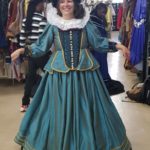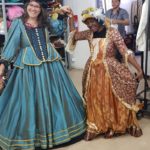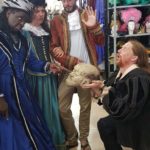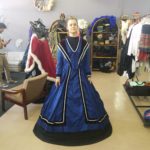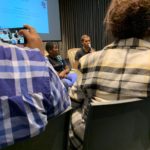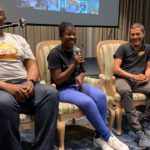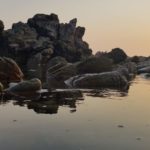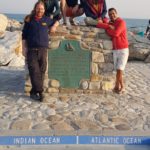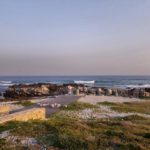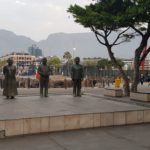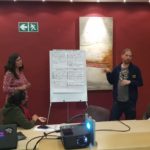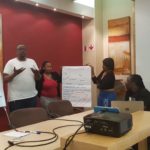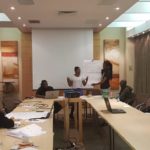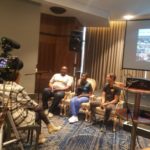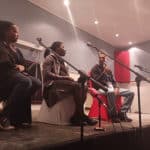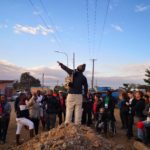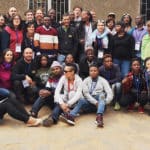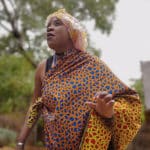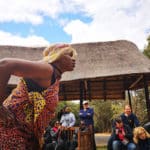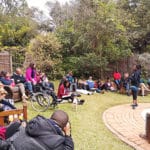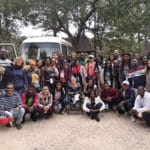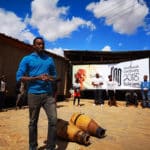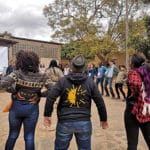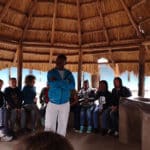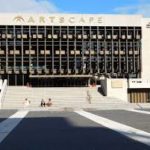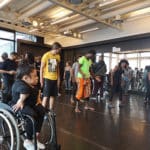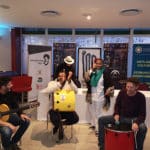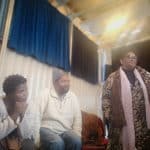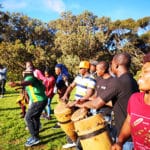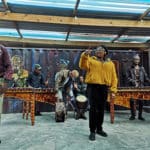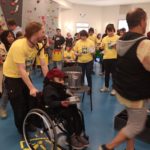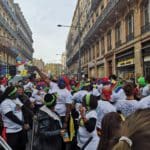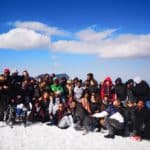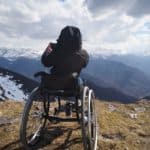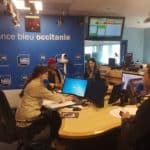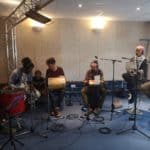Erasmus+ program
KA2 – Capacity building in the field of youth
Coordinator

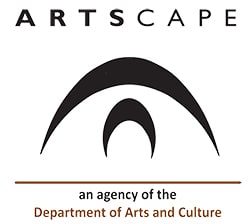
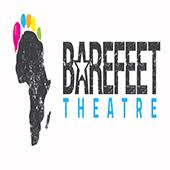
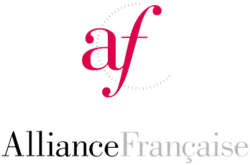
Cultural Construction of Youth and Young Construction of Culture
This exchange program aims to improve the international cooperative capacities and the quality of socio-educational animation of all stakeholders and strengthen the creative and innovative capacities of all actors involved. Samba Résille (France) is coordinating this project funded by the European Commission (Erasmus+ KA2 Program – Capacity Building in the field of Youth) in partnership with Barefeet Theatre (Zambia) and Artscape (South Africa).
The project addresses two issues simultaneously, and not separately, when public policies distinguish between them, namely the cultural construction of youth and the young construction of culture.
The work is conducted around cultural diversity from the perspective of the cultural construction of youth in terms of its own diversity as a singular being, as a person in a social group and as an individual linked to the destiny of his environment understood in the broadest sense, with a focus on vulnerable youth: street youth (Zambia), township youth in the post-Apartheid era (South Africa) and youth with disabilities (France).
How can we support artistic and cultural initiatives led by young people and characterized by creative innovation? How do youth workers need to adapt their mediation to these youth-driven cultural dynamics? How to strengthen the capacities of youth organizations to lead transnational cultural cooperation projects that contribute to the creation of economic and social wealth favorable to social transformation?![]()
Partners
 Artscape is a cultural institution, located in the heart of Cape Town. Originally established 40 years ago, Artscape has today developed into a vibrant, multifunctional creative arts centre, offering exceptional venue facilities and specialist theatrical services. The structure is committed to be a vector of growth and transformation for the performing arts, using tools which contribute to build the country, and establishes partnerships including all stakeholders.
Artscape is a cultural institution, located in the heart of Cape Town. Originally established 40 years ago, Artscape has today developed into a vibrant, multifunctional creative arts centre, offering exceptional venue facilities and specialist theatrical services. The structure is committed to be a vector of growth and transformation for the performing arts, using tools which contribute to build the country, and establishes partnerships including all stakeholders.
Artscape promotes the access to arts, and is today one of the biggest spaces in Africa dedicated to performing arts. Since a few years, Artscape uses an innovative program of education and training, offering opportunities of career for young artists and art technicians and in all the communities of South Africa.
Artscape organizes programs of artistic education and development, which lead to positive changes in the creation of a rich cultural and artistic community. Its programs concern urban, pre-urban and rural communities. The programs “Education”, “Skills” and “Development” are composed of artistic activities, and events like the Carnival of Cape Town and many festivals to enhance the communities.
 Barefeet Theater is a non-governmental organization (NGO) that uses play, creativity, and empowerment to give vulnerable children in Zambia a chance at a better life. Barefeet was founded by former street children as a response to the plight of young people living on Zambia streets. Through the power of performance, educational workshops, and more, we develop vulnerable youth into physically healthy, cognitively, and socially competent young people.
Barefeet has ‘toes’—our programme areas—which help inspire the most vulnerable youth to make positive life choices and move to a safe and healthy environment. To achieve this we use a multi-dimensional approach. Through theatre, performance, psychosocial support, creativity, and self-expression Barefeet works to address the needs of the children we work with.
We deliver life-saving information and inspiration to the kids who need it most through our outreach programs with children living on the streets, our interactive theater workshops with 2,000 children in 40 communities in Zambia, and on the national stage at our annual Barefeet Youth Arts Festival. Additionally, our children advocate for change for their fellow youth in the Barefeet Children Council, comprised of elected representatives from our partner children centers. Our final is the Barefeet performance company, which generates income to support our outreach programs and workshops.
“Sometimes the smallest step in the right direction ends up being the biggest step of your life. Tip toe if you must, just take the step.”
Barefeet Theater is a non-governmental organization (NGO) that uses play, creativity, and empowerment to give vulnerable children in Zambia a chance at a better life. Barefeet was founded by former street children as a response to the plight of young people living on Zambia streets. Through the power of performance, educational workshops, and more, we develop vulnerable youth into physically healthy, cognitively, and socially competent young people.
Barefeet has ‘toes’—our programme areas—which help inspire the most vulnerable youth to make positive life choices and move to a safe and healthy environment. To achieve this we use a multi-dimensional approach. Through theatre, performance, psychosocial support, creativity, and self-expression Barefeet works to address the needs of the children we work with.
We deliver life-saving information and inspiration to the kids who need it most through our outreach programs with children living on the streets, our interactive theater workshops with 2,000 children in 40 communities in Zambia, and on the national stage at our annual Barefeet Youth Arts Festival. Additionally, our children advocate for change for their fellow youth in the Barefeet Children Council, comprised of elected representatives from our partner children centers. Our final is the Barefeet performance company, which generates income to support our outreach programs and workshops.
“Sometimes the smallest step in the right direction ends up being the biggest step of your life. Tip toe if you must, just take the step.”
Mobilities
From 14th to 22th of July 2018
14 members from Samba Résille, 14 members from Arstcape and 14 members from Barefeet Theatre met in Lusaka, Zambia. 42 people plunged into the everyday life of Barefeet !
This first mobility in Zambia led to all stakeholders to present their organization and share their experiences in the youth field.
In particular, partners discovered and participate to Barefeet’s actions with children in schools, libraries, orphanages or dropping centers.
In particular, partners discovered and participate to Barefeet’s actions with children in schools, libraries, orphanages or dropping centers. This stay allowed also to collaborate and share artistic workshops, graffiti sessions, visits, discussions, gastronomic times… A way to share musical and cultural diversities. These artistic collaborations were presented at the Alliance Française in Lusaka with the presence of the French Ambassador in Zambia and at the meetings with children.
From September 2 to 11, 2018
From September 2 to 11, 2018, the three delegations met in Cape Town. During this week the French and Zambian delegations were able to share with the members of Artscape their cultural experience in the context of youth: cultural centres, schools, foundations, as many spaces on culture and youth. Numerous workshops, meetings and seminars have also been set up to better understand the artistic, educational and social approach in the Rainbow Nation in the youth sector.
Press conference, 5th of September 2018, Artscape Theatre Centre – Cape Town with the presence of Marlene Le Roux – CEO Artscape
From March 27th to April 5th,
the South African and Zambian delegations discovered the cultural environment of Samba and its approach to youth. Numerous meetings planned: with the members of Samba Résille during the workshops and during friendly times, the external workshops at the Stendhal secondary school, with the Pourquoi pas Nous (Why not us) at the local hospital of Muret, at the institute of the blind young people (IJA), at the CLAE Pierre and Marie Curie but also with the residents of the Goudouli House and the Peyrolières residence (ACSC la Madeleine)…
We also had times of sharing with the general public during the Toulouse Carnival on Sunday March 31 during the Big Parade and an international evening at La Chapelle on April 4. Finally, our African friends discovered our city and our department, with, in particular, an organized visit by the Departmental Committee of the Haute-Garonne Tourism to Saint Bertrand de Comminges and to the ski station “The Mourtis”.
Evaluation meeting
Cape Town, South Africa 07-15/09/2019
Artscape, Barefeet Theater and Samba Résille met in September in Cape Town for the final stage of the Youth Cultural Construction and Juvenile Culture Construction project, to evaluate this exchange program aimed at improving the capacity of international co-operatives and the quality of the socio-educational animation of all stakeholders, and strengthen the creative and innovation capacities of all actors involved.
The partners unanimously welcomed the success of the project, rich in round tables, study visits, socio-educational workshops, artistic performances, emotions that allowed to: – discover the work of the partners in their national environment – better identify our audiences and their specific needs (youth and youth professionals) – exchange many socio-educational and artistic tools and increase the competence of beneficiaries in multiple fields – ensure that the organizations themselves become competent by managing a complex international project to be implemented – create the space for a real encounter, a tangible and long-term intercultural exchange between people who had never previously known anything about each other – consolidate, through the sharing of unique experiences, the links between people from the same organization
This final mobility also allowed to share the tools to build future actions.
By better understanding the needs of youth, which must certainly be trained (cultural construction of youth) but firstly heard (youthful construction of culture), this project indeed confirms our common desire to offer new spaces of intercultural and interdisciplinary training, to fit most expectations ouf our audiences.
Conférence de presse, jeudi 12 septembre 2019, 12h
En présence de Marlene Le Roux, Directrice de Artscape Theatre Centre
Artscape Live – D.F. Malan St, Foreshore, Cape Town, 8001, Cape Town
Testimonies
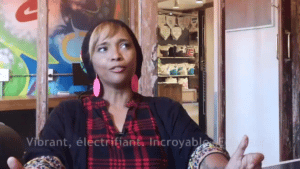 Imagine being stuck under a foreign sky with forty unknown people and one objective – to leave the world a better place for our youth. Now imagine those forty people divided into three delegations – Zambian, French and South African – and all the barriers that needed to be crossed. I am reminded of Maria Popova’s words, “Critical thinking without hope is cynicism. Hope without critical thinking is naivete.” For that very reason the cultural exchange between France, Zambia and South Africa is one of the most enriching experiences I encountered thus far. We left with more than hope in our hands.
Imagine being stuck under a foreign sky with forty unknown people and one objective – to leave the world a better place for our youth. Now imagine those forty people divided into three delegations – Zambian, French and South African – and all the barriers that needed to be crossed. I am reminded of Maria Popova’s words, “Critical thinking without hope is cynicism. Hope without critical thinking is naivete.” For that very reason the cultural exchange between France, Zambia and South Africa is one of the most enriching experiences I encountered thus far. We left with more than hope in our hands.
From Zambia we met Barefeet Theater, a group of deeply inspired and passionate dancers, actors and singers hell-bent on reintegrating homeless children back into society. We voyaged into their world littered with sounds and colour; where dust clung to the trees and the poverty was inescapable. Every single time a foot pounded the earth or hands reached for the sky, the struggles faced daily by Zambian children were shared. Aided by lightning fast dance moves and the calling of the drums – each engagement with our Zambian brothers from Barefoot Theater left us excited, tired and above all hopeful.
From the city of Toulouse we met the French delegation. Stemming from all walks of life their love for samba music is what draws people to them. Through music they are able to reach anyone regardless of age, creed or race. Yet it is the youth they are determined to positively impact. This can be seen clearly with the Pourquoi Pas Nous band, children who love the drums and just happen to have learning disabilities. Pourquoi Pas Nous means ‘why not us’ and under the leadership of Samba Resille have managed to break down walls (both their own and of others) through music.
Yet it was a visit to a boy’s orphanage that broke down the walls of all the delegations present. The French and South Africans presented Barefoot Theatre with sanitary pads for the homeless girls in their care. I recall Phodiso Matloga, our fearless South African leader looking at me as we entered the boys orphanage in Zambia and saying, ‘You are going to cry…’ And did we all cry…. The walls were lightly painted, the trees offering what little shade they could while children thronged within the walls.
The Barefeet team provide continuous workshops to the children in the orphanage and other organisations they are partnered with. Once a week street children are found, offered a bath, food and a chance to take a step off the streets – if they chose to. The street children are found in states of disrepair, dirt caked in their skin, on dark and dangerous corners. Some of their eyes still filled with sleep induced by the drugs bubbling in their bodies while others nurse injuries they succumbed to the night before. A few were reluctant to join in the activities but the pounding drums and the vivacity of the Zambians could not be resisted for too long.
Hugues from Samba Resille said, “I tried talking to a child who was a bit older but every word felt like an injustice. After all I am white and privileged. Yet, this child with so little took on the task of reassuring me. He said that if he has to wait 100 years to see a door open, he will. Until then he will survive the streets and everything else. I walked away believing he could…”
Christelle Dreyer, a dancer and artist in her own right was equally affected,” I know I complain about being disabled but these kids live in such hard circumstances that I had to pause… “ Christelle champions the rights of the disabled wherever she goes and imparted life lessons to those who chose to surround her at the orphanage. Shamiela Jaffer summed up the day with one sentence, “It was in that moment that we all became human….” Yes, we put aside all of our silly anxieties and tasked our minds and bodies to what was before us – children who needed help. Children at risk. This was the reason we were here after all…
Best practises were shared as well as the challenges faced by all. We deduced that the Zambians have a rich culture of dance that transmits any message to those most vulnerable. The French have a sincere exploratory and curious nature that cut through any perceived notions of a place or a people. It was Greg Ecureuil from Samba Resille, who revealed one element that unites South Africans, and had I not travelled I would remain unaware of. South Africans love to sing. We have good and bad songs for every occasion and need very little encouragement to lift our voices to the heavens.
I left Zambia deeply affected, determined to give more, certain that my voice is armour enough to tackle the social ills South Africa is confronted with. And even more certain of those at my side. As I stared at the Zambian moon one last time the words of the poet Rilke comforted me…
“Be patient toward all that is unsolved in your heart and to try to love the questions themselves like locked rooms and like books that are written in a very foreign tongue.”
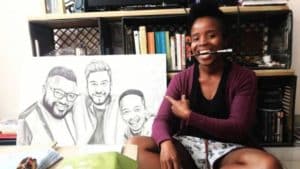
Cape Town – South Africa 2nd of November 2018
Jazz and History, a sensitive immersion in the history of a South African township
At the cultural center of Langa Township, located in the suburbs of Cape Town, we met the jazz singer Sylvia Mntuyedwa, and her husband, historian. By combining their talents, History and singing, we lived an exceptional moment, a precise and sensitive immersion in the history of South Africa. I have now a better understanding of 2 essential notions to understand the South African context:
1. Apartheid The apartheid was officially instituted in 1948, but preceded by an old segregation organized during the British supervision (cf. the Native Urban Areas Act of 1923, which introduced the residential segregation in the cities). The apartheid is based on an apparent paradox: it assumes at the same time a totalitarian control and exploitation of black populations, and the statement of a separated development (it’s the meaning of the word apartheid), aiming to tell appearances the empowerment of these same communities.
This iniquitous lie, that planned to confine black people in townships supposedly autonomous, but without any development tools and maintained in a dependency and total economic exploitation, is perfectly illustrated by the story of Langa, the first township created in Cape Town. Langa Township was created in 1927. Model of segregationist urbanism, it was home for lots of families evicted from the city of Cape Town. This group was joined by single workers coming from the west countryside. This division was encouraged by the Afrikaners, because it allowed them to maintain a competition and a mutual distrust between those 2 groups living a very different situation; on one side single farmers crammed in shacks, on the other side families living a little bit better that looked unfavorably on these men with no ties and more precarious than themselves.
2. Community Despite everything, time and the necessity to fight the common enemy (cf. the rise in power of the ANC) reduced the differences: the community of Langa was born. In such a context of adversity and atomization (uprooting, dislocation of social, familial and traditional webs), the reconfiguration in a stable and self-regulated society had a crucial importance, a concrete and symbolic one.
On this matter, the discussions during the meeting to prepare us for the mobility let see the difficulties that the French people can have to understand the notion of community as it’s lived in lots of countries (Anglo-Saxon countries, Africa, South America). It indicates in France an indivisible and abstract reality (national, religious, scientific community, etc.), while in South Africa, it includes a social and concrete reality, a living area where the feeling of membership is really strong and maintained by concrete and daily socio-cultural relationships.
On this matter, the discussions during the meeting to prepare us for the mobility let see the difficulties that the French people can have to understand the notion of community as it’s lived in lots of countries (Anglo-Saxon countries, Africa, South America). It indicates in France an indivisible and abstract reality (national, religious, scientific community, etc.), while in South Africa, it includes a social and concrete reality, a living area where the feeling of membership is really strong and maintained by concrete and daily socio-cultural relationships.
To go further, I recommend you the following documents (in french):
Myriam Houssay-Holzschuch, Le Territoire volé, une géographie culturelle des quartiers noirs de Cape Town (Afrique du Sud)
https://tel.archives-ouvertes.fr/tel-00185377/document
Cherry Schrecker, La Communauté. Histoire critique d’un concept dans la communauté anglo-saxonne.
http://www.melchior.fr/lecture/la-communaute-histoire-critique-dun-concept-dans-la-communaute-anglo-saxonne
Step 1: Lusaka in Zambia
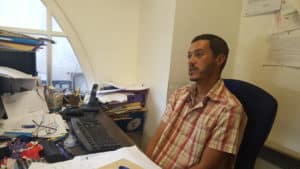
This stay was sensitive because it touched our senses by collecting artistic collaborations, for the songs, the music and the dances from various regions to be mixed together, demonstrating that the links between individuals built through art are powerful and go beyond the borders of all presumed difference. The culinary art was not outdone, touching our taste buds, surprising them sometimes with the grilled caterpillars, or challenging us with the mouse skewers!
This stay was sensitive because it touched us deep down our souls when we discovered the daily actions of Barefeet Theatre for children and young people living in the streets. After a natural emotional phase, we could measure the huge talent of Barefeet members to act taking care of others. Of the children and the youth, but also of us, discovering dreadful and unbearable situations, with our prism of the welfare state. In Zambia, there is no social policies, no cultural policies including vulnerable youth. It’s the civil society which organizes itself with the tools it has to assume the basic care to respond their psycho-social distress: to wash, eat, open places to talk, bandage the wounds and the suffering, sing, dance, and laugh.
https://samba-resille.org/international-platform-en/zambie-afrique-du-sud/
This project was an illustration of what the cultural diversity can offer to each and every one of us to achieve an intellectual and affective satisfying existence, because our rich experiences were shared between youth workers, and through the analysis of our practices, we had the feeling to expand our horizons of cooperation and touch closely what could be our sustainable future links.
The wealth of knowledge and experiences gained during this exceptional exchange is not quantifiable.
However, Thinking back to each leg of our journey together, each country is distinctive and yet there runs a common thread. The thread of believing in the empowerment of the youth, through arts and culture despite various challenges faced by all. We started exploring while education each other and building a network, we would not have built without the exchange.
As a disabled Artist I gained valuable knowledge on the success and difficulties each country has when engaging with disabled youth. I am honored to have been able to share my knowledge on this as well as learn from each participant.
With a warm heart I encourage the growth of knowledge through our continued communication.
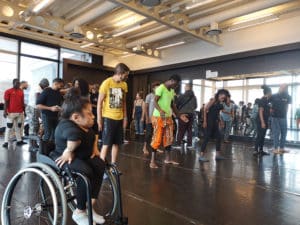
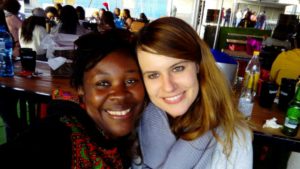 Tribute to an extraordinary woman
Grace Tombozi Banda works for the NGO Barefeet, in Zambia. Barefeet is located in Lusaka and acts for the future and wellbeing of Zambian youth. The organization was a partner of Samba Résille in the project “Cultural construction of youth and young construction of culture”.
Tribute to an extraordinary woman
Grace Tombozi Banda works for the NGO Barefeet, in Zambia. Barefeet is located in Lusaka and acts for the future and wellbeing of Zambian youth. The organization was a partner of Samba Résille in the project “Cultural construction of youth and young construction of culture”.
Grace is an exceptional woman, a brilliant woman, skilled and warm, and between us grew an incredible friendship, taller and stronger than borders and nationalities.
Our fist exchanges were professional. I was surprised to find her a little bit cold in her communication. But it was before understanding that her way to work is more Anglo-Saxon that Latin, more straight to the point that our way to interact, us people from the Mediterranean Sea.
As the project progressed, we got to know each other. Grace is a woman with no filter: she let me enter her universe, she talked to me, spontaneously and with no digression, about her happiness but also the obstacles she faces.
Daily, she has to deal with multiple difficulties. First of all, she is woman, in a professional world designed for men. In Zambia, women have to stay home and take care of the kids. The social pressure on her is strong for her to stop her professional activities.
Moreover, Grace became the CEO of Barefeet, and now takes the decisions with the board. It’s not always the easiest job… Zambia is indeed a developing country, which cannot finance all the public policies, and lacks of infrastructure (transportation, communication…). The financial situation of Barefeet can be complicated, and Grace has to fight every day to keep the organization going.
Grace is so brave and strong, and has a lot of energy and joy to give. Her way to work taught me that empathy, respect and rigor don’t have nationality. She is a kind woman, who helped me trust myself, a woman that I profoundly admire, who gave me hope and the desire to surpass myself. She is a woman shaping tomorrow’s world.
Céline Rodriguez Verjan
Découvrez ce magnifique projet #Erasmusplus en vidéo ! https://t.co/Ot7uWjJzjM
— EDUCATION ADULTE FR (@EPALE_FR) July 16, 2019




